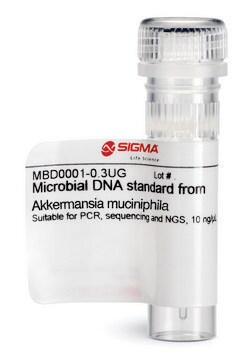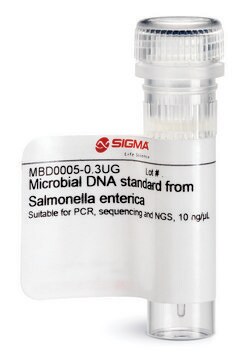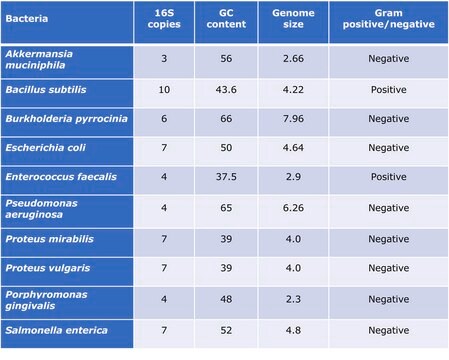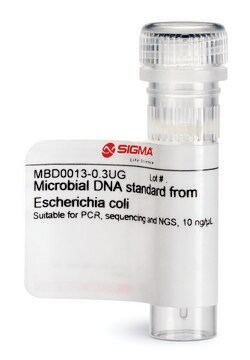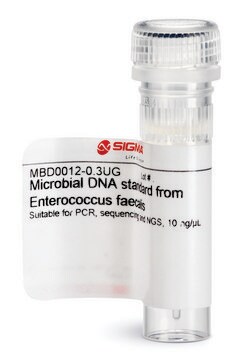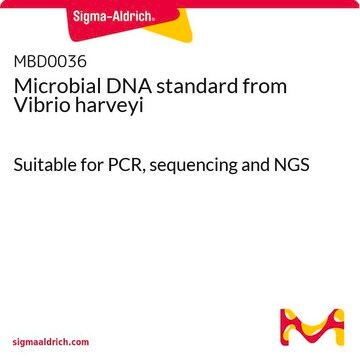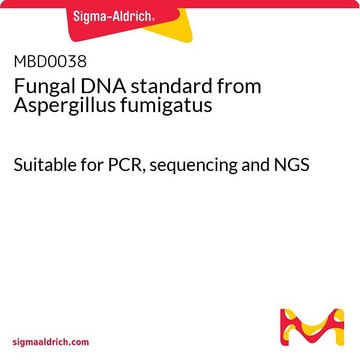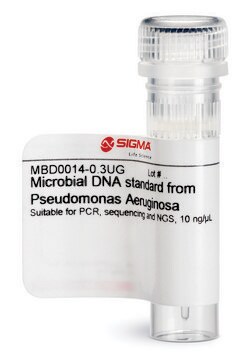MBD0023
Microbial DNA standard from Deinococcus radiodurans
Suitable for PCR, sequencing and NGS, 10 ng/μL
About This Item
Recommended Products
Quality Level
form
liquid
concentration
10 ng/μL
technique(s)
DNA extraction: suitable
DNA sequencing: suitable
PCR: suitable
shipped in
ambient
storage temp.
−20°C
General description
Deinococcus radiodurans is an extremophilic, heterotrophic, non-motile, non-spore-forming, aerobic tetracoccus bacterium. 2 The cell envelope of Deinococcus radiodurans stains as a gram-positive, but the two membranes that separated by a peptidoglycan layer, makes it more similar to typical gram-negative bacteria. 3 Deinococcus radiodurans is an extremophilic microorganism that can survive harsh conditions such as cold, high temperature, acid, alkali, resistance to desiccation, oxidative stress, ionizing radiation and ultraviolet radiation. 3 Mechanisms responsible for these extremophilic characteristics include: efficient repair of DNA damage 4, 5, Nucleotides Excision Repair (NER) 6, unique DNA mismatch repair (MMR) method 7 and efficient cellular mechanisms such as proteolytic protein for removal damaged and misfolded proteins, Nudix hydrolase 8 a broad-spectrum of transcription factor and a unique regulatory protein, which stimulates recA gene transcription after exposure to ionizing radiation 9.The large tolerance of the extremophile, Deinococcus radiodurans to the extraordinary conditions makes this bacterium as a tool for metabolic engineering 10.
Read here how to use our standards to ensure data integrity for your microbiome research.
Application
Suitability
Physical form
Storage Class Code
12 - Non Combustible Liquids
WGK
WGK 1
Flash Point(F)
Not applicable
Flash Point(C)
Not applicable
Choose from one of the most recent versions:
Certificates of Analysis (COA)
Sorry, we don't have COAs for this product available online at this time.
If you need assistance, please contact Customer Support.
Already Own This Product?
Find documentation for the products that you have recently purchased in the Document Library.
Articles
The use of standards is critical to the integrity of metagenomics research. Learn how DNA standards for bacteria, fungi, and viruses are applied to studying the microbiome. Choose standards for E. coli and other key species, as well as mixed community standards.
Our team of scientists has experience in all areas of research including Life Science, Material Science, Chemical Synthesis, Chromatography, Analytical and many others.
Contact Technical Service
